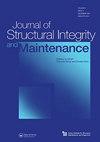Knowledge-driven stochastic reliable modeling for steel bridge deck condition rating prediction
IF 3.1
Q2 ENGINEERING, CIVIL
Journal of Structural Integrity and Maintenance
Pub Date : 2021-04-03
DOI:10.1080/24705314.2020.1862965
引用次数: 2
Abstract
ABSTRACT The structurally deficient bridges increased from 6.2% to 7% of total bridges in California state. With this percentage, 7%; California state occupies one of the top states for bridges in “poor„ condition. Steel bridges represent about 11% of its bridge networks, so determining the condition rating objectively instead of subjectively is crucial. This paper aims to help significantly optimize the maintenance process by providing a rational basis for making decisions. This paper has integrated knowledge, stochastic analysis, Regression technique, and modeling to help the highway agencies to make a more reliable decision for future maintenance based on predicted conditions. Stochastic Regression models have been built using a training dataset extracted from the National Bridge Inventory (NBI) database for California State steel bridges, considering structural and operational parameters. A validation test has been performed using a new real dataset to measure observed data's correspondence to the predicted values. The results of Average Validity Percentage (85.6%) and Coefficient of Determination (R2 = 91.5%) show that the models' accuracy, the power, and scalability of integrating the knowledge-driven models are acceptable. The integrated developed models provide the infrastructure authority with actionable insights for smarter planning and maintenance decisions as better future outcomes.基于知识驱动的钢桥面状态等级预测随机可靠模型
加州桥梁结构缺陷率从6.2%上升到7%。这个百分比是7%;加利福尼亚州是桥梁状况“糟糕”的州之一。钢桥约占其桥梁网络的11%,因此客观而非主观地确定状态等级至关重要。本文旨在通过提供决策的合理依据,帮助显著优化维护过程。本文将知识、随机分析、回归技术和建模相结合,帮助公路管理机构在预测路况的基础上对未来的养护做出更可靠的决策。利用从国家桥梁清单(NBI)数据库中提取的训练数据集,考虑结构和运行参数,为加州州立钢桥建立了随机回归模型。使用新的真实数据集进行验证测试,以测量观测数据与预测值的对应关系。平均效度百分比(85.6%)和决定系数(R2 = 91.5%)的结果表明,模型的准确性、整合知识驱动模型的能力和可扩展性是可以接受的。集成的开发模型为基础设施当局提供了可操作的见解,以实现更智能的规划和维护决策,从而获得更好的未来结果。
本文章由计算机程序翻译,如有差异,请以英文原文为准。
求助全文
约1分钟内获得全文
求助全文
来源期刊

Journal of Structural Integrity and Maintenance
ENGINEERING, CIVIL-
CiteScore
3.90
自引率
9.50%
发文量
24
 求助内容:
求助内容: 应助结果提醒方式:
应助结果提醒方式:


